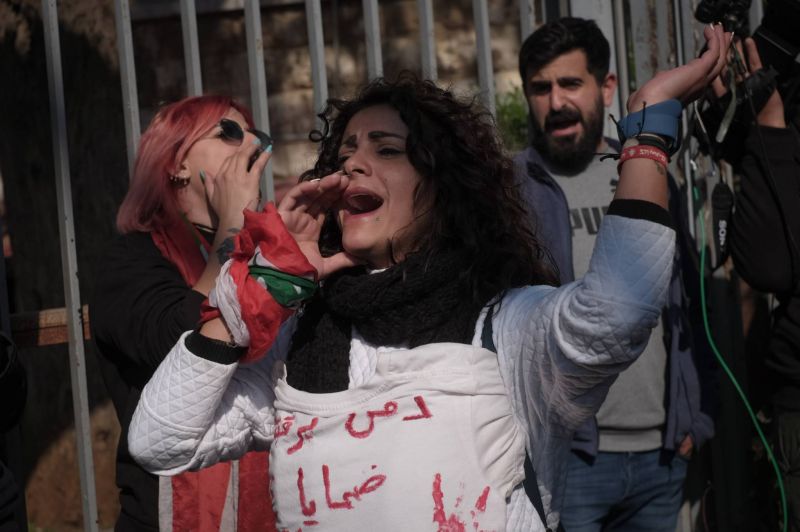
A protester outside Beirut's Justice Palace on Jan. 26, 2023. (Credit: João Sousa/L'Orient Today)
Want to get the Morning Brief by email? Click here to sign up.
The Higher Judicial Council canceled a meeting scheduled for yesterday as activists and relatives of the Aug. 4, 2020 Beirut port blast victims gathered outside the Beirut Justice Palace to protest the latest developments in the blast probe. The protesters opposed the council’s potential dismissal of lead port blast investigator Judge Tarek Bitar after the country’s top public prosecutor Ghassan Oueidat undermined his attempt to retake control of the investigation, issued charges against him and released all detainees held in relation to the probe. Head of the Beirut port security department Ziad al-Awf, one of the 17 detainees released by Oueidat, returned to the United States shortly after his release, his lawyer Sakhr Hachem confirmed to L'Orient Today. Oueidat, doubling down on his rejection of Bitar’s re-emergence, sent a note, seen by L'Orient Today, to court officials forbidding them to acknowledge receipt of "any document" that would emanate from the investigating judge. Bitar on Monday ordered the release of five people and charged eight others, including Oueidat, contending that as investigating judge he is accountable to executive, rather than judiciary, authority to revitalize the case — which had been frozen for more than a year pending the resolution of complaints against him.
Caretaker Health Minister Firass Abiad announced that the ministry will start setting unsubsidized medicine prices daily and subsidized medicine prices weekly after a brief strike by pharmacies. The ministry will start issuing “a daily index for the unsubsidized medicines’ prices according to the [lira to] dollar exchange rate in the parallel market,” Abiad said. Similar measures have been adopted by the Energy Ministry and Economy Ministry for fuel and bread prices respectively. Earlier in the day, pharmacies closed “in solidarity with patients” who are no longer able to buy their medication or cannot find the medications they need in the Lebanese market. Some patients are forced to depend on foreign sources for medicines amid drug shortages, illegal stockpiling and smuggling of pharmaceutical products on the black market. Pharmacists have decried medicine distributors’ stopping of deliveries amid exchange rate fluctuations.
Protesters blocked roads across Lebanon to decry the lira’s continued to slide to new record lows on the parallel market. The local currency’s free fall left it hovering around LL62,000 to the dollar on the parallel market yesterday, causing the Energy Minister to hike fuel prices twice in one day. A similar increase the day before led to brief gas station closures until the ministry updated fuel prices to reflect the increased exchange rate. The Economy Ministry yesterday evening slightly increased bread prices for the second time in 48 hours. Demonstrators closed part of Beirut's Bechara al-Khoury Avenue as well as a road in the Qasqas neighborhood, while others sealed off the main entrance to the city of Sour with burning tires. The lira has fallen around LL10,000 in value since Monday, while its depreciation from LL40,000 to LL50,000 to the dollar had taken around three months, according to the online platform Lirarate. An expert speaking to L’Orient Today, however, tempers the losses with the fact that the lira had already lost 95 percent of its value much earlier in the now more than three-year-old financial crisis.
Head of UN Peace Operations Jean-Pierre Lacroix “praised the Lebanese authorities’ serious investigation” into the killing last month of an Irish UN peacekeeper in South Lebanon, according to the Grand Serail. Lacroix’s remarks followed a meeting yesterday with Lebanon's caretaker prime minister, foreign minister, parliament speaker and defense minister. The military court earlier this month charged seven people suspected of having been part of a Dec. 14 attack on a United Nations Interim Force in Lebanon (UNIFIL) convoy in al-Aaqbiya, South Lebanon, that killed 23-year-old Irish peacekeeper Sean Rooney and injured three fellow soldiers. During Lacroix’s meeting with Parliament Speaker Nabih Berri, the legislative head also stressed “the importance and role of the international forces in monitoring and stopping the daily Israeli breaches.” Earlier this week, tensions sparked amid entries by Israeli vehicles into sensitive areas alongside the border.
The Internal Security Forces intercepted a suspected attempt to smuggle cocaine into Lebanon, announcing on Tuesday the arrest of two people at the Beirut international airport. The two suspects allegedly ingested two kilograms of cocaine which were “extracted from the body [of the suspects] through internationally recognized methods and under the supervision of the Sheikh Zayed bin Sultan Al Nahyan Medical Center,” the ISF said. Authorities announced the seizure of a similar quantity of the illicit stimulant also arriving from Brazil to the Beirut airport last month, nearly five times the amount in April 2021 and more than 15 times as much in December 2020. The commander-in-chief of the Lebanese Army, Gen. Joseph Aoun, following a raid against alleged drug traffickers earlier this month, claimed that drug trafficking is “more dangerous than terrorism.”
In case you missed it, here’s our must-read story from yesterday: “Why is the manoushe so expensive?”
Compiled by Abbas Mahfouz